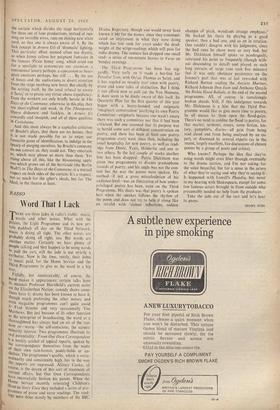RADIO
Word That I Lack
THERE are three jades in radio's stable: music, words and other noises. What with the Pirates, the Light Programme and its new pri- vate paddock all day on the Third Network, Music is doing all right. The other noises are Probably doing all right, too. But words are another matter. Certainly we hear plenty of People talking and they happen to be using words to pull the cart, still the jade is not strictly a carthorse. Now is the time, surely, their debts to music paid, for the Home Service and the Third Programme to give us the word in a big Way.
Fitfully, but unmistakably, of course, the word makes it appearances; certain talks have It, instance Professor Hurstfield's current series on the Elizabethan Nation; comedy shows some- times have it; drama has been known to have it, though much preferring the other noises; and even magazine programmes can't quite avoid it—Fred Streeter and very occasionally Tim Matthews. But just because of ifs other function as the newsprint of broadcasting, the word as a thoroughbred has always had an air of the ran- dom or—worse—the self-conscious, the earnest Minority interest. Two programmes illustrate its real potentiality: From Our Own Correspondent 18 a weekly satchel of topical reports, spoken by the correspondents themselves from the midst of their own rain-forests, paddy-fields or ice- shelves. The programme's quality, which is extra- ordinarily and consistently high, lies in the wtt) the reports are expressed. Alistair Cooke, 111 course, is the doyen of this sort of treatment 01 current affairs, but Our Own Correspondent, have successfully broken his patent. When the -dour Service recently reinstate Children', -dour as Story Time they included a series of pro- grammes of prose and verse readings. The read- ings were done mostly by members of the BBC Drama Repertory, though you'would never have known it biit for the names, since they communi- cated an enjoyment in what they were doing Which has lain sunk for years under the dead- weight of the script-readings which still pass for radio drama. The venture has dropped one small seed—a series of ten-minute Stories in Verse on
Sunday evenings. _
The Third Programme has been less nig- gardly. Very early on it made a bee-line for Paradise Lost, with Dylan Thomas as Satan, and it has regaled us steadily ever since with poetry, prose and some talks of distinction. But I think it can afford now to pull out the Vox Humana. It does seem to be dimly aware of this itself. Its Quarterly Plan for the first quarter of this year began with a heavy-handed and enigmatic 'imaginary conversation' justifying its own Poetry Committee—enigmatic because one wasn't aware there was such a committee nor that it had been criticised. But one assumed that its purpose was to herald some sort of diffident concentration on poetry, and there has been at least one poetry-- programme every- week since then, including the usual hospitality for new poetry, as well as read- ings from Dante, Yeats, HOlderlin and one or two others. In the last couple of weeks another hint has been dropped : Patric Dickinson was given two programmes to discuss gramophone records of poetry, and his angle was not the con- tent but the way the poems were spoken. His method—if not a gross miscalculation of his audience-level—was an illustration of how under- privileged poetry has been, even on the. Third Programme. His thesis was that poetry is spoken best when the speaker follows the rhythm of the poem and does not try to help it along like an invalid with 'violent inflections, sudden changes of pitch, wondrous strange emphases.' He backed his thesis by playing us a good speaker, then a bad one, and so on in rotation. One couldn't disagree with his judgments, since the bad ones he chose were so very bad, but Mr. Dickinson himself spoke so ponderously, reiterated his point so frequently (though with- out descending to detail) and played us such long extracts of turge (one took five minutes) that it was only obstinate persistence on the listener's part that was at last rewarded with Richard Burton reading the Ancient Mariner, Richard Johnson Don Juan and Anthony Quayle the Robin Hood Ballads, at the end of the second programme. All, of course, in tantalisingly broken shards. Still, if this indulgence towards Mr. Dickinson is a hint that the Third Pro.. gramme would like to give more time to poetry, by all means let them open the flood-gates. There's no need to confine the flood to poetry, for that matter; sermons, essays, some fiction, his- tory. pamphlets, diaries—all gain from being read, aloud and from being analysed by an ex- pert, or discussed by several experts (as in the. recent, largely excellent, live discussions of chosen poems by a group of poets and critics).
Who knows? Perhaps the idea that they're using words might even filter through eventually to the drama 'section, and I'm not asking for the voice beautiful, but for a sense in the actors of what they're saying and why they're saying it. It happened with Lowell's Phaedra, but never in my hearing with Shakespeare, except for some few famous actors brought in from outside who presumably needed no help from the producer.
Take the jade out of the cart and let's hear its paces.






























 Previous page
Previous page